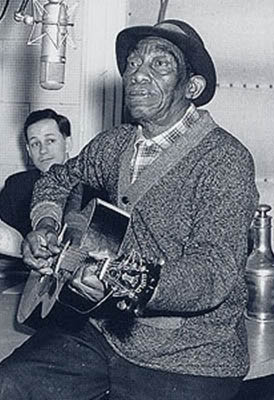Mississippi John Hurt
Mississippi John Hurt

John Smith Hurt, better known as Mississippi John Hurt, was a significant figure in American country blues music. Born on March 8, 1893, in Avalon, Mississippi, Hurt developed a deep passion for music from a young age. He taught himself to play the guitar around the age of nine and honed his skills by playing at local dances and parties while working as a sharecropper.
In 1928, Hurt made his first recordings for Okeh Records, but they did not achieve commercial success. Despite this setback, Hurt continued to work as a farmer while nurturing his musical talents.
In 1963, blues enthusiasts Dick Spottswood and Tom Hoskins tracked down Hurt in Avalon and persuaded him to move to Washington, D.C. There, he was recorded by the Library of Congress in 1964, which contributed to the American folk music revival of the era. Hurt's recordings helped to rediscover many other blues musicians from his generation who had faded into obscurity.
As part of the folk music revival, Hurt began performing on the university and coffeehouse circuit alongside other Delta blues musicians who were also brought out of retirement. He also recorded several albums for Vanguard Records during this period.
Despite his newfound recognition, Hurt returned to Grenada, Mississippi, in 1966, where he passed away at the age of 73.
Mississippi John Hurt's music has had a lasting impact, and his songs have been covered by numerous artists spanning different genres, including Bob Dylan, Dave Van Ronk, Jerry Garcia, and Gillian Welch, among others. His legacy as a pioneering figure in country blues continues to influence musicians to this day.
Mississippi John Hurt, born in Teoc, Carroll County, Mississippi, and raised in Avalon, Mississippi, had a remarkable journey in the world of music. He learned to play the guitar at the young age of nine, inspired by the guitar of William Henry Carson, a friend of his mother's. His early years were filled with playing old-time music for friends and at local gatherings while working as a farmhand and sharecropper.
Hurt's style of playing was dynamic and syncopated, perfect for dancing, and he occasionally performed with local musicians, including fiddle player Willie Narmour. When Narmour secured a recording opportunity with Okeh Records in 1928, he recommended Hurt to producer Tommy Rockwell. Hurt's audition and subsequent recording sessions in Memphis and New York City marked the beginning of his recording career.
Despite the excitement of recording, Hurt's records did not achieve commercial success, and Okeh Records folded during the Great Depression. Hurt returned to his quiet life in Avalon, working as a sharecropper and continuing to play music at local events.
Mississippi John Hurt's early recordings may not have gained widespread popularity at the time, but they laid the foundation for his later recognition during the folk music revival of the 1960s. His story reflects the resilience and talent of many blues musicians of his era, whose contributions to music history have since been recognized and celebrated./https://tf-cmsv2-smithsonianmag-media.s3.amazonaws.com/filer_public/e7/3e/e73edec4-b08c-432c-a25c-9e55fa89df9a/opener-novdec2022_c03_mississippijohnhurt-noborder.jpg)
Mississippi John Hurt's music experienced a resurgence in popularity during the folk music revival of the 1960s, thanks in part to the inclusion of his renditions of "Frankie" and "Spike Driver Blues" in The Anthology of American Folk Music in 1952. This sparked considerable interest in locating him, which ultimately led to his rediscovery in 1963 by musicologist Dick Spottswood and Tom Hoskins./https://tf-cmsv2-smithsonianmag-media.s3.amazonaws.com/filer_public/e7/3e/e73edec4-b08c-432c-a25c-9e55fa89df9a/opener-novdec2022_c03_mississippijohnhurt-noborder.jpg)
After confirming Hurt's authenticity through a series of performances, Hoskins convinced him to move to Washington, D.C., to perform for a wider audience. Hurt's talent and charm quickly won over audiences, and his performance at the 1963 Newport Folk Festival further elevated his status in the folk revival scene. Subsequently, he recorded an album titled Folk Songs And Blues, which was released in August 1963.
For a brief period, Hurt enjoyed widespread acclaim, performing at various venues, including colleges, concert halls, and coffeehouses. He even appeared on The Tonight Show Starring Johnny Carson. His repertoire, which included ragtime songs like "Salty Dog" and "Candy Man," as well as blues ballads like "Spike Driver Blues" and "Frankie," resonated deeply with audiences.
Hurt's influence extended across multiple music genres, from blues and spirituals to country, bluegrass, folk, and contemporary rock and roll. His gentle demeanor was reflected in his music, characterized by a soothing blend of country, blues, and old-time melodies.
Tragically, Hurt passed away on November 2, 1966, due to a heart attack in Grenada, Mississippi. His final recordings, made in New York City earlier that year, were posthumously released in 1972 as the Vanguard LP Last Sessions, ensuring that his legacy continued to resonate with music lovers for years to come.
References
- Eagle, Bob; LeBlanc, Eric S. (2013). Blues: A Regional Experience. Santa Barbara, California: Praeger. p. 214. ISBN 978-0313344237.
- ^ "Mississippi John Hurt: American Singer and Musician". Britannica.com. October 29, 2023.
- ^ "Trail of the Hellhound: Mississippi John Hurt". nps.gov. Retrieved May 29, 2008.
- a b c d e Russell, Tony (1997). The Blues: From Robert Johnson to Robert Cray. Dubai: Carlton Books. p. 121. ISBN 1-85868-255-X.
- a b Segal, David (June 24, 2001). "Mississippi John Hurt, Discovered Again". The Washington Post. ISSN 0190-8286. Retrieved February 27, 2018.
- a b Block, Rory (June 4, 2013). "Avalon: A Tribute to Mississippi John Hurt". Stony Plain Records. Retrieved December 11, 2013.
- a b c d e Cohen, Lawrence (1996). Liner notes to Avalon Blues: The Complete 1928 Okeh Recordings. Columbia/Legacy CD.












































